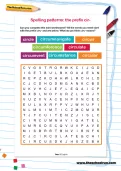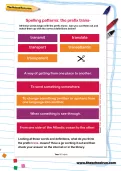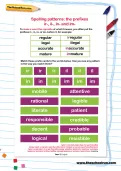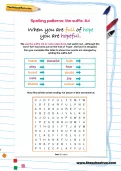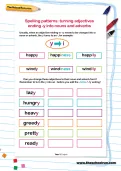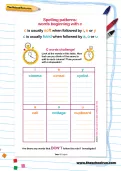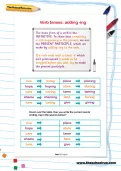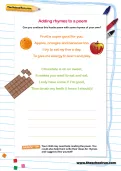Worksheet finder
Search critera
Spelling patterns: the prefix cir-
Can you complete this mini-wordsearch? All the words you need start with the prefix circ- and are below. What do you think circ- means?
Spelling patterns: the prefix tele-
All these words begin with the prefix tele-. Can you cut them out and match them up with the correct definitions below?
Spelling patterns: the prefix trans-
All these words begin with the prefix trans-. Can you cut them out and match them up with the correct definitions below? Looking at these words and definitions, what do you think the prefix trans- means? Have a go working it out and then check your answer on the internet or in the library
Spelling patterns: the prefixes ir-, il-, in- and im-
To make a word the opposite of what it means, you often put the prefixes ir-, il-, in- or im- before it. Match these prefix cards to the words below. Can you see any pattern in the way you match them?
Spelling patterns: the suffix -ful
We use the suffix -ful to make adjectives, but watch out – although the word ‘full’ has been put on the end of ‘hope’, the last l is dropped. Can you complete this table to show how words are changed by adding the suffix-ful? Then find all the words ending -ful above in this wordsearch.
Spelling patterns: turning adjectives ending -y into nouns and adverbs
Usually, when an adjective ending in –y needs to be changed into a noun or adverb, the y turns to an i. Can you change these adjectives to their noun and adverb form? Remember to turn the y into an i before you add the -ness / -ly ending!
Spelling patterns: words beginning with c
The letter c is usually soft when followed by i, e or y but it is usually hard when followed by a, o or u. Look at the words in this table. How fast can you think of five more to add to each column? Time yourself with a stopwatch!
Spelling patterns: words ending in vowels
It is very common for English words to end in e. It is more unusual for words to end in a, i, o and u. This table shows words ending in these four vowels. How fast can you think of more? Time yourself! Many of these words are foreign, but are now used as part of the English language. Which countries did they come from?
Verb tenses: adding -ing
This is a KS1 English worksheet on verb tenses ending in -ing, created by a primary-school teacher to help your child learn at home.
Adding rhymes to a poem
Read this foodie poem then see if you can continue it with some rhymes of your own.
